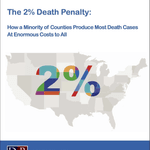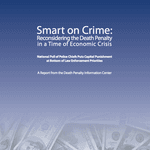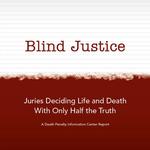In-Depth Reports
Reports: 6 — 10
Oct 01, 2013
The 2% Death Penalty: How a Minority of Counties Produce Most Death Cases at Enormous Costs to All
Contrary to the assumption that the death penalty is widely practiced across the country, it is actually the domain of a small percentage of U.S. counties in a handful of states. The burdens created by this narrow but aggressive use, however, are shifted to the majority of counties that almost…
Read MoreJun 22, 2011
Struck by Lightning: The Continuing Arbitrariness of the Death Penalty Thirty-Five Years After Its Reinstatement in 1976
The United States Supreme Court approved the re-instatement of the death penalty 35 years ago on July 2, 1976. Although the death penalty had earlier been held unconstitutional because of its arbitrary and unpredictable application, the Court was willing to sanction new systems that states had proposed to make capital punishment less like“being struck by lightning” and more like retribution for only the“worst of the worst” offenders. The Court also deferred to…
Read MoreOct 20, 2009
Smart on Crime: Reconsidering the Death Penalty in Time of Economic Crisis
Smart on Crime is a new report from the Death Penalty Information Center that explores the prospect of saving states hundreds of millions of dollars by ending the death penalty. The report also serves to release a national poll of police chiefs in which they rank the death penalty at the bottom of their priorities for achieving a safer…
Read MoreJun 09, 2007
A Crisis of Confidence: Americans’ Doubts About the Death Penalty
According to a national public opinion poll conducted in 2007, the public is losing confidence in the death penalty. People are deeply concerned about the risk of executing the innocent, about the fairness of the process, and about the inability of capital punishment to accomplish its basic purposes. Most Americans believe that innocent people have already been executed, that the death penalty is not a deterrent to crime, and that a moratorium should be placed…
Read MoreOct 18, 2005
Blind Justice: Juries Deciding Life and Death With Only Half the Truth
Blind Justice, the most recent report to be released by the Death Penalty Information Center (DPIC), is the first to focus on the problems of the death penalty from the perspective of jurors. While jurors have always occupied an esteemed position in the broader criminal justice system in the United States, in capital cases the responsibility of jurors is even more critical as they decide whether defendants should live or die. Even with this unique authority in capital…
Read More



